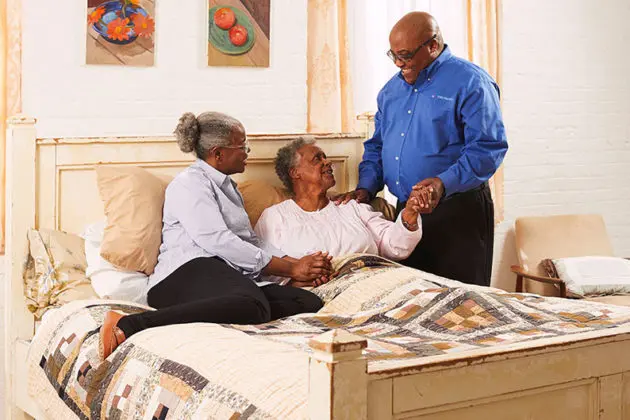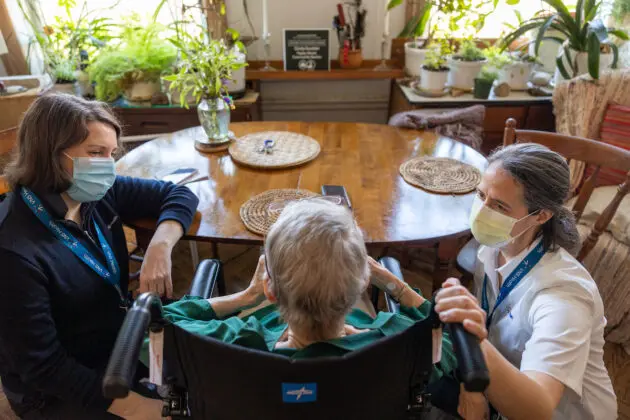You have been caring for your loved one for years. As they get sicker, they’ve started to need more and more help and you need more support.
That’s when you may be wondering what your options are, and whether it’s time for hospice care.
Hospice care is for people whose illness or condition no longer responds to treatment. The goal of care becomes making them comfortable, rather than trying to cure their illness or condition.
It’s best to start hospice as soon as your loved one is eligible, but knowing when that is — and then making the decision to start hospice care — can be tough. Here is how their physician will decide, and how you can tell, whether it may be time for hospice.
Signs a Person is Ready for Hospice
The Palliative Performance Scale (PPS) is a tool that helps health care providers check the day-to-day functioning of a person with a terminal illness. It guides providers as they consider hospice care for your loved one.
Here are other signs that your loved one might be ready for hospice. Let their health care providers know about things like:
- Recurring infections like pneumonia or urinary tract infections
- Unintended weight loss that’s not due to a reversible cause (like diuretics)
- Shortness of breath
- Uncontrollable cough
- Uncontrollable diarrhea
- Nausea and vomiting
- Pain that responds only to increasing high doses of painkillers
- Weakness
- Changes in consciousness level
- Needing help with activities of daily living, like getting dressed
- Bedsores
- Eating less
- Mental health challenges
- Feeling frustrated that treatment isn’t working or that side effects can’t be controlled
- Mental exhaustion
- Depression
There are also other signs that are specific to certain diseases, such as incontinence in people with dementia or minimal urine production in people with acute kidney failure.
Hospice care supports individuals at the end of life, as well as their families, by providing medical, emotional, and spiritual care. The goal is to help make the last months as comfortable and meaningful as possible.
When Is a Person with Dementia Ready for Hospice Care?
If your loved one has dementia, their physician will use the Functional Assessment Staging Tool (or FAST scale) to track the progression of the disease. They may be eligible if they have complications or other health conditions and aren’t expected to live more than six months.
Along with the FAST score, your loved one’s physician will look for cognitive signs of hospice readiness, including:
- Being unable to speak or communicate meaningfully
- Saying words or phrases only occasionally
- Being unaware of their where they are or of recent experiences
The Importance of Starting Hospice Early
It’s natural to be hesitant about starting hospice. It means accepting that the end of life is near for your loved one and stopping treatments that you had hoped would cure their illness.
However, starting hospice early gives your loved one more time to take advantage of its benefits, like peace and comfort. Hospice care also supports you and the rest of your family. Your loved one’s nurse will help you understand what to expect and how to prepare. The hospice team also includes social workers and counselors. Early enrollment helps your loved one manage symptoms at home — without needing frequent trips to the hospital — so it can mean less time spent in the hospital at the end of life.
When asked, most families say they wish they had started hospice care sooner.
What’s the Difference Between Home Care and Hospice Care?
If your loved one is receiving home care, you might wonder why you should switch to hospice care. There are important differences between the two.
Home care is for people who need care for a specific period of time as they recover. It’s covered under Medicare if prescribed by a physician as part of a person’s medical care. You can also pay out-of-pocket for extended home care or care that’s not part of treatment. Home care can be given at any point during your loved one’s illness.
There’s also personal care, which is for people who need help with daily activities to stay safe in their homes.
Hospice care is for people who have a terminal illness and are nearing the end of life. Their symptoms are hard to manage at home and treatment to cure or slow down their disease don’t work. Hospice includes the services and support a person and their family and caregivers need at this time, and are covered by most insurance.
What Hospice Covers that Home Care Doesn’t
When making the decision, be aware that switching to hospice care means additional services, including:
- Increased caregiver support like respite care days, which means you can take breaks, go to important family events, and feel better prepared to care for your loved one
- Guidance in talking to family members, including how to explain what’s happening to young children
- Specialty support if your loved one is a veteran or part of the LGBTQ+ community
- Spiritual support from counselors who can help your loved one honor cultural or religious traditions at the end of life
- More in-home care, which may include longer home health aide hours
- Additional medical support from physicians and nurse practitioners
- Support from volunteers, who provide companionship and help with things like keeping friends and family updated about your loved one’s condition
- More coverage for medical supplies
Deciding to Start Hospice
Don’t hesitate to talk about hospice with your loved one’s health care provider. Physicians can be hesitant to bring up the subject. But that doesn’t mean your loved one isn’t ready for it, or that you shouldn’t start planning for hospice. You can also ask your loved one’s home care nurse whether they think it’s time to talk about hospice and have them walk you and your loved one through the first steps.
Before you talk to your loved one’s physician, prepare by using resources, such as “Your Conversation Starter Guide” from The Conversation Project initiative.
Make a list of topics you want to discuss with your loved one’s physician, such as:
- How will you remain involved in your loved one’s care?
- What role the physician’s will play once your loved one is in hospice
- How will your role and the physician’s role change as your loved one’s health changes
- Whether the physician will be comfortable following your loved one’s advanced directive. Physicians aren’t legally required to follow such directives if they have ethical or moral disagreements.
Conversations with your loved one and the rest of your family are necessary, but they can be challenging. Look for resources, such as Talking with Your Family About Hospice Care. And remember – you don’t need to go through it alone. You can always reach out to your loved one’s health care providers and the hospice agency for support.



